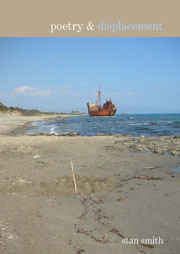Book contents
- Frontmatter
- Contents
- Acknowledgements
- 1 Introduction: Poetry, Place and Displacement
- 2 On the Edge of Things: Philip Larkin
- 3 A Double Man in a Double Place: Iain Crichton Smith
- 4 Salvaged from the Ruins: Ken Smith's Constellations
- 5 Lost Bearings: Christopher Middleton
- 6 ‘What Like Is It?’ Carol Ann Duffy's Différance
- 7 Darkening English: Post-imperial Contestations in Seamus Heaney and Derek Walcott
- 8 Living in History
- 9 An Age of Simulation: Tall Tales and Short Stories
- 10 Nowhere Anyone Would Like To Get To
- 11 Milking the Cow of the World: Displacement Displaced
- Notes
- Bibliography
- Index
6 - ‘What Like Is It?’ Carol Ann Duffy's Différance
- Frontmatter
- Contents
- Acknowledgements
- 1 Introduction: Poetry, Place and Displacement
- 2 On the Edge of Things: Philip Larkin
- 3 A Double Man in a Double Place: Iain Crichton Smith
- 4 Salvaged from the Ruins: Ken Smith's Constellations
- 5 Lost Bearings: Christopher Middleton
- 6 ‘What Like Is It?’ Carol Ann Duffy's Différance
- 7 Darkening English: Post-imperial Contestations in Seamus Heaney and Derek Walcott
- 8 Living in History
- 9 An Age of Simulation: Tall Tales and Short Stories
- 10 Nowhere Anyone Would Like To Get To
- 11 Milking the Cow of the World: Displacement Displaced
- Notes
- Bibliography
- Index
Summary
The other country
Carol Ann Duffy was born in Glasgow in 1955, of an Irish mother and a Scottish father, himself a third-generation scion of the Irish diaspora on Clydeside. When she was four the family moved to Stafford in the English north-west Midlands, after her father got a job as a fitter with the English Electric Company. She attended school there, and then read philosophy from 1974 to 1977 at Liverpool University. After a time with Granada Television in the north-west, she went to work in London from 1981, returning north, to a university post in Manchester, in 1995. In its casual displacements, dictated by the accidents of employment opportunities, Duffy's life can be seen as both exemplary and unexceptional in registering the pattern of living in the mobile and expanding economy of postwar and contemporary Britain. In her poetry, however, she has forged a remarkable mythos of displacement, sharpened in particular by the insights into the nature of language of the linguistic philosopher Ludwig Wittgenstein, whose work she first encountered at university.
The true location of Duffy's 1990 collection The Other Country is an intercalated ‘otherwhere’, not simply the Scotland which she had to leave as a child to live in an alien England, but an existential space in the interstices of many places. ‘Words, Wide Night’ (p. 47) establishes both an approximation and a distance between the two concepts juxtaposed in its title, to make in its closing two lines a similar play with the fraught relation between similitude and identity.
- Type
- Chapter
- Information
- Poetryand Displacement , pp. 101 - 122Publisher: Liverpool University PressPrint publication year: 2007



